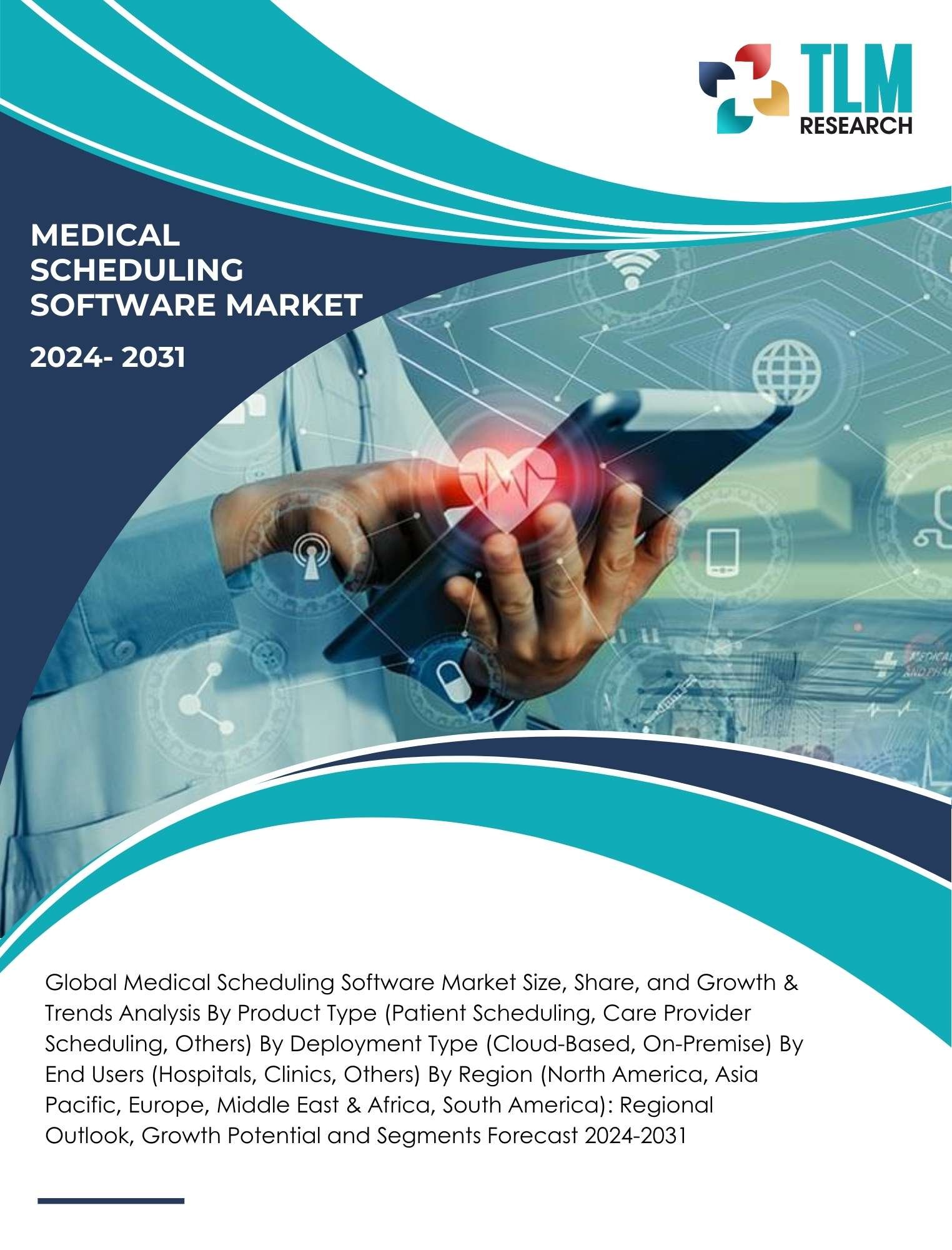Description
The Global Medical Scheduling Software Market size was USD $ 318.47 million in 2023 and is projected to reach USD $ 462.2 million by 2031, with a CAGR of 13.3 % during the forecast period.
Global Medical Scheduling Software Market: Overview
The medical scheduling software market is rapidly evolving with innovations aimed at enhancing patient management and workflow efficiency in healthcare. One significant trend is the shift towards a patient-centric approach, prioritizing features such as online appointment booking, automated reminders, and improved communication between patients and healthcare providers. For instance, Athenahealth’s patient engagement platform allows patients to conveniently schedule appointments, receive reminders, and communicate with their providers through a mobile app.
Artificial Intelligence (AI) and Machine Learning (ML) are increasingly integrated into these systems to optimize scheduling, predict patient no-shows, and offer personalized recommendations based on data analytics. Cerner’s Scheduling solution utilizes AI to analyze historical data and provide intelligent scheduling recommendations to reduce patient wait times and improve resource utilization.
Telehealth integration has also become pivotal, allowing for seamless virtual appointments and efficient management of telehealth practices, as seen in Epic’s MyChart Bedside platform. Cloud-based solutions are gaining traction due to their scalability, accessibility, and cost-effectiveness, providing real-time updates and enhanced security. Athenahealth’s cloud-based platform enables healthcare organizations to access and manage patient data securely from anywhere.
Interoperability with electronic health records (EHRs) and practice management software is improving data flow and reducing administrative burdens, as demonstrated by the integration between NextGen Healthcare’s scheduling solution and its EHR system.
Automation of tasks like appointment reminders and billing further streamlines workflows, while patient engagement tools such as portals, mobile apps, and chatbots empower patients and improve communication. These advancements are reshaping the medical scheduling software landscape, fostering efficiency, patient satisfaction, and overall healthcare delivery outcomes.
Global Medical Scheduling Software Market: Covid-19 Impact
The COVID-19 pandemic has significantly impacted the medical scheduling software market, prompting increased demand for telemedicine solutions and remote patient management tools. Providers are prioritizing solutions that enhance efficiency, ensure patient safety, and comply with evolving healthcare regulations. As healthcare facilities adapt to new norms, there’s a growing emphasis on integrating digital scheduling platforms that facilitate seamless communication and scheduling flexibility, thereby optimizing resource utilization and improving patient outcomes.
Global Medical Scheduling Software Market: Growth Drivers
1. Increasing Demand for Streamlined Operations:
Medical scheduling software facilitates efficient appointment booking, reducing wait times and optimizing resource allocation. This capability meets rising patient expectations for seamless healthcare services, driving adoption among providers.
2. Integration with Telehealth Services:
The surge in telehealth adoption post-pandemic has boosted the demand for scheduling software that integrates with virtual consultation platforms. This integration enhances patient access to care, improves scheduling flexibility, and supports remote patient monitoring.
3. Advancements in AI and Automation:
AI-powered scheduling algorithms optimize appointment scheduling based on patient data, provider availability, and historical patterns. Automation reduces administrative burden, minimizes errors, and improves overall operational efficiency in healthcare facilities.
Global Medical Scheduling Software Market: Restraining Factors
1. Cost and Implementation Challenges:
High initial costs and complexities associated with software implementation and customization can deter smaller healthcare practices from adopting advanced scheduling solutions.
2. Data Security Concerns:
Healthcare data is highly sensitive, and maintaining compliance with stringent regulatory standards (e.g., HIPAA) poses challenges. Ensuring robust data encryption, access controls, and secure data sharing practices remains crucial but can be resource intensive.
Global Medical Scheduling Software Market: Opportunity Factors
1. Expansion in Emerging Markets:
Increasing healthcare expenditure in emerging economies presents opportunities for market expansion. Demand for digital health solutions, including scheduling software, is growing as these regions modernize their healthcare infrastructure.
2. Rising Popularity of Mobile Health (mHealth) Solutions:
Mobile-centric scheduling applications enable patients to book appointments conveniently and access health services remotely. Developing user-friendly, secure mobile platforms can capture a significant market share among tech-savvy healthcare consumers.
Global Medical Scheduling Software Market: Challenges
1. Interoperability Issues:
Integration challenges with existing healthcare IT systems and interoperability issues between different software platforms hinder seamless data exchange and workflow continuity.
2. Resistance to Change:
Healthcare professionals may resist adopting new scheduling technologies due to established workflows, concerns about learning curves, and potential disruptions to patient care. Overcoming resistance through effective training and support is crucial for successful implementation.
Global Medical Scheduling Software Market: Segmentation
- Based on Product Type: The market is segmented into Patient Scheduling, Care Provider Scheduling, Others.
- Based on Deployment Model: The market is segmented into Cloud-Based, On-Premise.
- Based on End User: The market is segmented into Hospitals, Clinics, Others.
Global Medical Scheduling Software Market: Regional Insights
1. North America:
In North America, the medical scheduling software market is experiencing robust growth driven by increasing digitization in healthcare facilities. This software streamlines appointment booking, resource allocation, and patient management, enhancing operational efficiency and patient satisfaction. Key factors fueling market expansion include the rising adoption of electronic health records (EHR) systems, such as Epic’s MyChart platform, and government initiatives like the HITECH Act that promote healthcare IT infrastructure.
Providers are increasingly prioritizing patient convenience and operational efficiency, leading to a surge in demand for advanced scheduling solutions. Market players are responding by developing user-friendly interfaces and incorporating AI-driven features for predictive scheduling. For instance, Athenahealth’s patient engagement platform utilizes AI to analyze historical data and provide intelligent scheduling recommendations to reduce patient wait times.
Additionally, ensuring compliance with stringent data privacy regulations like HIPAA is a key focus area for vendors. Cerner’s Scheduling solution, for example, is designed to securely integrate with EHR systems and protect patient information. As healthcare organizations strive to optimize workflows and improve patient care delivery, the medical scheduling software market in North America is poised for continued growth in the coming years, driven by the increasing adoption of digital health technologies and the need for efficient, patient-centric healthcare solutions.
2. Asia Pacific:
The Asia Pacific medical scheduling software market is experiencing significant growth driven by increasing healthcare digitization and demand for efficient patient management systems. This region’s healthcare sector is adopting advanced technologies to streamline scheduling processes, enhance patient care quality, and improve operational efficiency in healthcare facilities.
Factors such as rising healthcare expenditure, government initiatives towards digital health transformation, and the growing prevalence of chronic diseases are further fuelling market expansion. Key players are focusing on developing user-friendly software solutions that integrate with electronic health records (EHR) and offer features like appointment booking, patient reminders, and resource allocation optimization. W
ith expanding healthcare infrastructure and a shift towards patient-centric care models, the Asia Pacific medical scheduling software market is poised for continued growth, presenting opportunities for innovation and technological advancements in healthcare delivery systems.
Competitive Landscape:
- Kareo
- Oracle
- NXGN Management, LLC.
- American Medical Software
- Q-nomy Inc.
- Biosoftworld Medical Software
- Caspio; SuperSaaS
- PatientStudio
- AdvancedMD, Inc.
- TIMIFY
- Sign In Solutions Inc
- Kyruus
Global Medical Scheduling Software Market: Recent Developments
June 24, 2024 – Artificial intelligence (AI) can now be meaningfully leveraged by more healthcare providers than ever before as NextGen Healthcare expands the capabilities of its AI-driven ambient listening technology for mid-sized and large enterprises, NextGen Ambient Assist, and introduces NextGen Office Ambient Assist, a tailored solution for small practices.
September 25, 2023 NextGen Healthcare, Inc. a leading provider of innovative, cloud-based healthcare technology solutions, announced its extended agreement with Athletico Physical Therapy (Athletico), one of the nation’s largest providers of the highest quality orthopaedic rehabilitation services to communities, employers and athletes.





